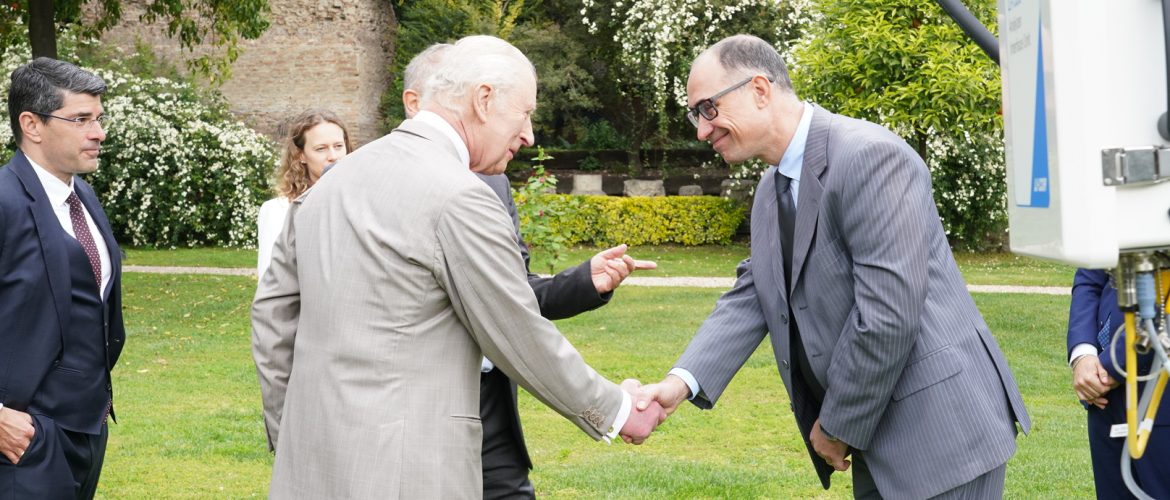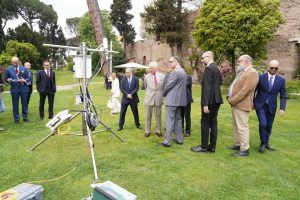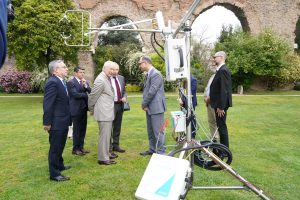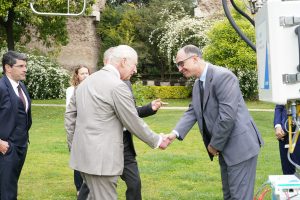A delegation of researchers from the Institute of Research on Terrestrial Ecosystems of the National Research Council of Italy (CNR-IRET) met King Charles III of England during his state visit to Italy, together with a delegation from the European Forest Institute (EFI) and the Circular Bioeconomy Alliance (CBA)
During his state visit to Italy, King Charles III of England met on Wednesday, April 10, 2025, at the gardens of the British Ambassador’s Residence in Rome, with a delegation of researchers from national scientific institutions. He attended a series of demonstrations showcasing scientific approaches and measurement tools used by the global network of Living Labs of the Circular Bioeconomy Alliance (CBA). Among those present before His Majesty, alongside colleagues from prestigious research institutions and universities, were Carlo Calfapietra, Director of the Institute of Research on Terrestrial Ecosystems of the National Research Council of Italy (CNR-IRET), Coordinator for the CNR of the National Biodiversity Future Center (NBFC), and Italy’s Focal Point for the Integrated Carbon Observation System (ICOS); Dario Papale, Head of the ICOS Ecosystem Thematic Centre at CNR-IRET; and Silvano Fares, Director of the Institute for Mediterranean Agricultural and Forest Systems (CNR-ISAFOM).
The CEO of CBA, Marc Palahí, and Chief Scientist, Giuseppe Scarascia-Mugnozza, presented CBA’s new scientific activities currently underway. In particular, they highlighted the Living Labs for Regenerative Landscapes, an initiative that integrates science, technology, and traditional knowledge to holistically regenerate landscapes, support communities, and rethink value-creation production chains.
The significance of the National Biodiversity Future Center (NBFC) was also underscored, as it is likely the largest biodiversity research project ever funded, with the CNR as the leading institution.
Matilda van den Bosch, a researcher at CBA and EFI-Biocities, presented the latest scientific findings on the importance of nature for human health and well-being. Numerous studies have shown that exposure to nature, including urban forests, can improve human health—particularly mental health among young people. New Living Labs focused on this topic are currently being designed.
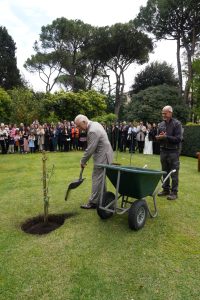
The King also showed interest in the establishment of the Living Lab for Medicinal Plants in Italy, funded by ABOCA, an Italian company dedicated to improving human and planetary health. The CBA-ABOCA Living Lab has initiated research on the cultivation of medicinal plants using agroforestry systems in regenerative and resilient landscapes of central Italy. The goal is to scientifically assess their impact on biodiversity, carbon sequestration, soil health, and socio-economic implications.
The impact of environmental disturbances and global changes on trees and landscapes—particularly in the metropolitan area of Rome—along with landscape and environmental restoration initiatives, were presented to the King by Giulia Bonella, Director of the Castelporziano Presidential Estate, and Sabrina Alfonsi, Rome’s Municipal Councillor.
The King also visited scientific installations used to assess the impacts of climate change on plants and trees and to measure the ability of urban and peri-urban parks to absorb carbon and air pollutants, thereby improving air quality in cities. These demonstrations were led by Carlo Calfapietra, Riccardo Valentini (professor at the University of Tuscia), and colleagues Dario Papale and Silvano Fares. The researchers showcased instruments and devices designed for environmental and biodiversity monitoring. These technologies, employed in the European ICOS infrastructure, collect data from hundreds of European stations to obtain high-precision measurements of greenhouse gas concentrations in the atmosphere, the sea, and terrestrial ecosystems.
“We are very pleased,” said Marc Palahí, “to present to the King our latest research and ideas for new projects to be developed worldwide. Italy is a key country for CBA, and many of our researchers are based here, working closely with Italian scientific institutions.”


